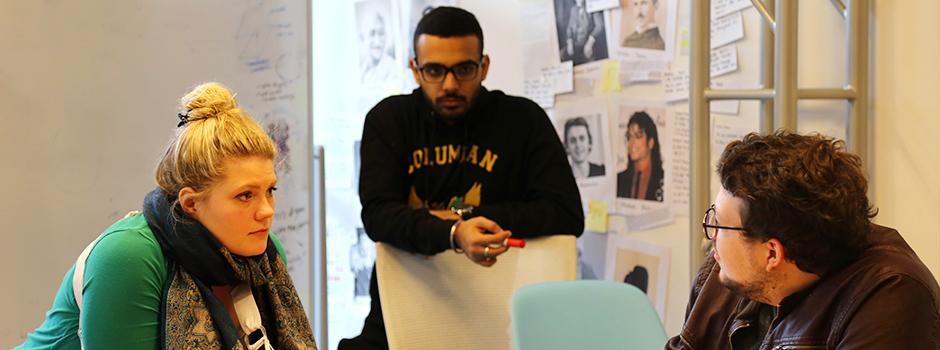From February 18 to 19, a group of NYU Shanghai students hammered out “VoiceHover,” a laser-controlled device to aid communication skills of those with cerebral palsy and other speech disabilities, by restoring their ability to “talk.” The inventive design pushed the team to win Hack NYU 2017’s assistive technology track.
Three teams from NYU Shanghai joined the 48-hour competition with more than 60 counterparts from the New York and Abu Dhabi campuses. Participants were required to conduct designs in four areas including assistive technology, educational technology, healthcare and sustainability & social impact. All designs were evaluated based on multiple criteria such as their innovativeness, functionality and social impact.
VoiceHover, created by IMA students Maggie Walsh ‘17 and Tyler Rhorick ‘17, as well as Computer Science major Shikhar Sakhuja ‘19, is an assistive solution for sufferers of immobility and speech impediments that uses a laser-controlled keyboard which exports inputs into text files, then read by Python coding, produces an output of natural sounds for a text-to-speech functionality.
“Before, patients had to rely on head-mounted lasers and the assistance of others to speak,” said Rhorick. “We want to provide a low cost option that could turn vision into voice.”
Due to time constraints, the team wasn’t able to finish all of VoiceHover’s envisioned features, but future development would include eye tracking as well as predictive text and translation features, according to Walsh.
IMA Professors Christian Grewell and Rodolfo Cossovich also spent the weekend encouraging and coaching students in the studios of NYU Shanghai’s campus.
“It has been inspiring to see our students from different backgrounds collaborating together to make a positive impact on the community,” said Professor Cossovich.
“City Therapy VR,” a physical therapy treatment bolstered by virtual reality, was another eye-catching NYU Shanghai design. The idea was to build a low cost and engaging VR game to distract patients from the often mundane and painful routine of physical therapy exercises.
According to Baaria Chaudhary ‘17, inspiration for the idea came from classmate and hackathon opponent, Maggie Walsh, who was bored with the slow recovery from an arm injury. “We wanted to add a game component to the therapy for a more entertaining recovery period,” Chaudhary said.
Hack NYU, the largest annual hackathon event spanning NYU’s global network, is a competition for entrepreneurs, engineers and thinkers from around the globe to collaborate on building technological and impactful solutions together.
“Hack NYU is a great experience of turning ideas into reality,” Walsh said. “It also provides a stage for us to showcase ourselves to potential employers and through it, we can discover new career opportunities.”



